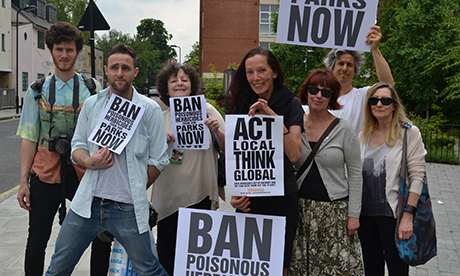Glyphosate used by council ‘probably carcinogenic’ to humans, report finds
A report by the World Health Organisation’s (WHO) cancer agency has found that a controversial pesticide used by Hackney Council is “probably carcinogenic to humans”.
Glyphosate is an active ingredient in the pesticide often branded as Roundup. Marketed by US firm Monsanto it is one of the most widely used weedkillers in the UK.
A summary of the International Agency for Research on Cancer’s (IARC) report, published in The Lancet Oncology, reclassifies glyphosate as 2A substance, a rating which could mean it would not be authorised for use in the EU.
The chemical has been found in food, water and in the air after it has been sprayed, the report found. However, glyphosate use is generally low in and near homes, where the general public would face the greatest risk of exposure.
The report also said there was “limited evidence” that glyphosate was carcinogenic in humans for non-Hodgkin’s lymphoma.
Hackney Council’s use of glyphosate has come under fire in the past from environmental activist and fashion designer Katharine Hamnett CBE.
In 2014, Ms Hamnett led a campaign against the council’s use of the chemical on the streets and parks, arguing that glyphosate causes health problems and damages the environment.
But many industry representatives maintain there is no evidence the chemical, approved for use by the European Union and the U.S Government, poses any risk to human health.
Responding to the IARC’s classification of glyphosate, Dr Penny Bevan, Director of Public Health at Hackney Council, said that whether a substance was “meaningfully carcinogenic” often depends on its dosage.
“For instance, also classified as 2A by the IARC are alcohol, sunlight and night shifts. The concerns over glyphosate have been raised in the context of large-sale agricultural use on food crops and laboratory tests on animals, neither of which are comparable to spraying individual weeds”, she said.
“Hackney Council follows government guidance on weed control and glyphosate has been declared safe for the targeted spraying of weeds by Defra, Public Health England, the Health and Safety Executive and the EU.
“We will continue to follow government guidance on weed control but are open to alternative removal methods if they can be shown to be effective and affordable.”
A spokesperson for the Department for Environment, Food and Rural Affairs (Defra) said: “There are extensive regulations in place so that people and the environment are protected from pesticides. Glyphosate is approved for use as a herbicide in the EU and is currently under review to ensure it is safe.”
Dr. Philip Miller, Vice President Global Regulatory Affairs at Monsanto said: “We don’t know how IARC could reach a conclusion that is such a dramatic departure from the conclusion reached by all regulatory agencies around the globe.”

